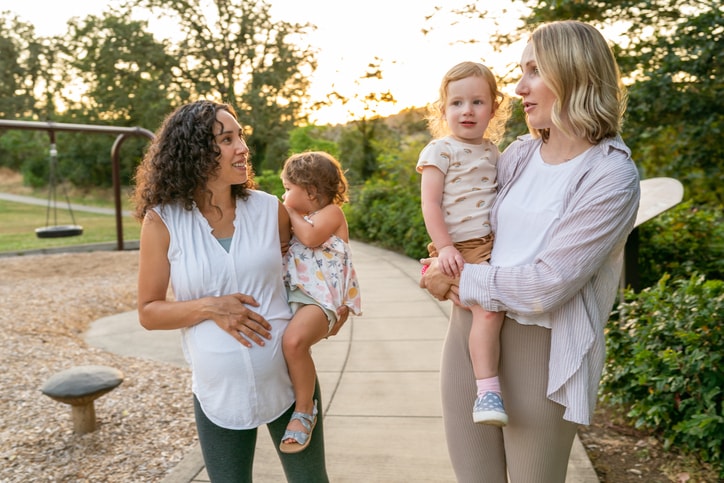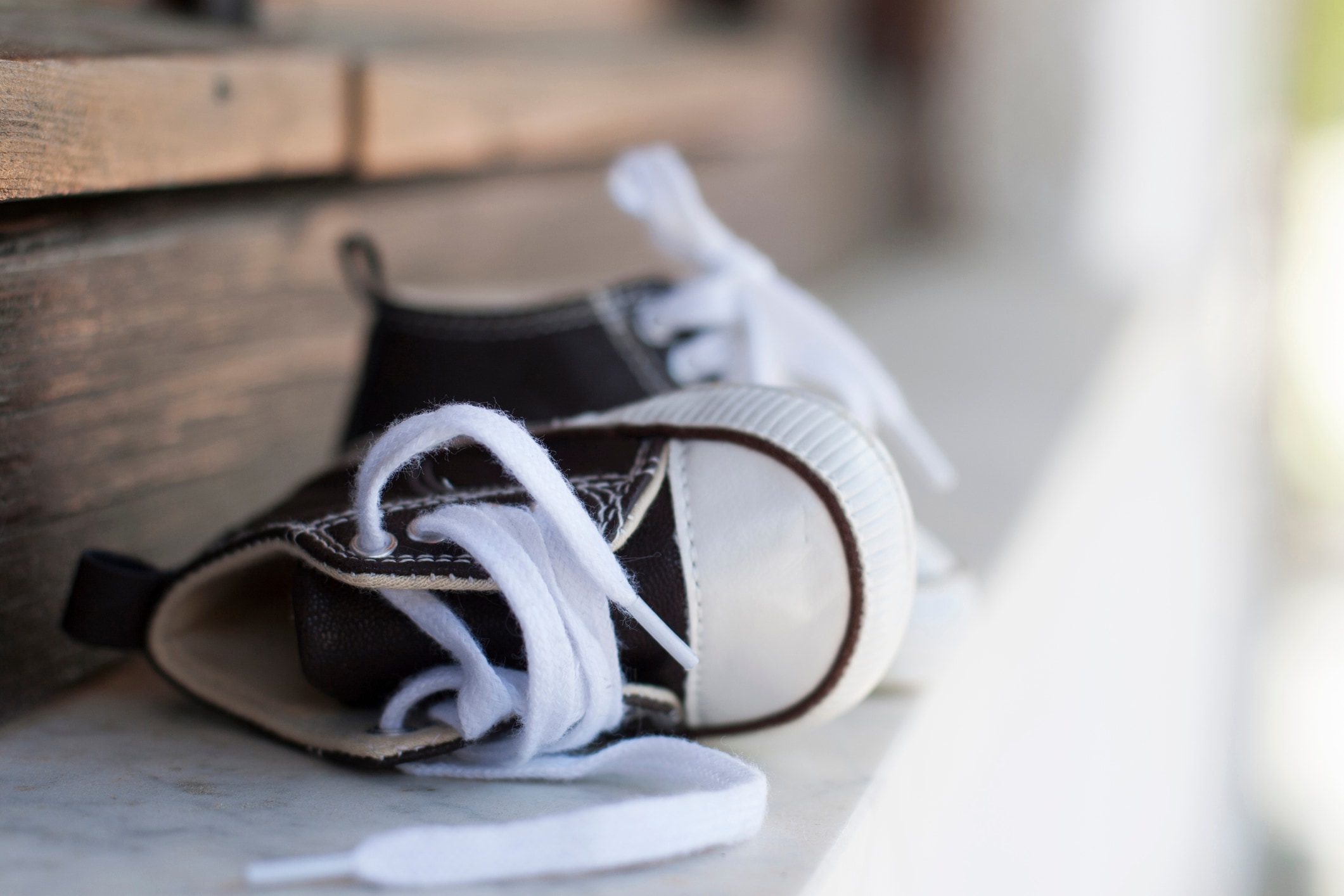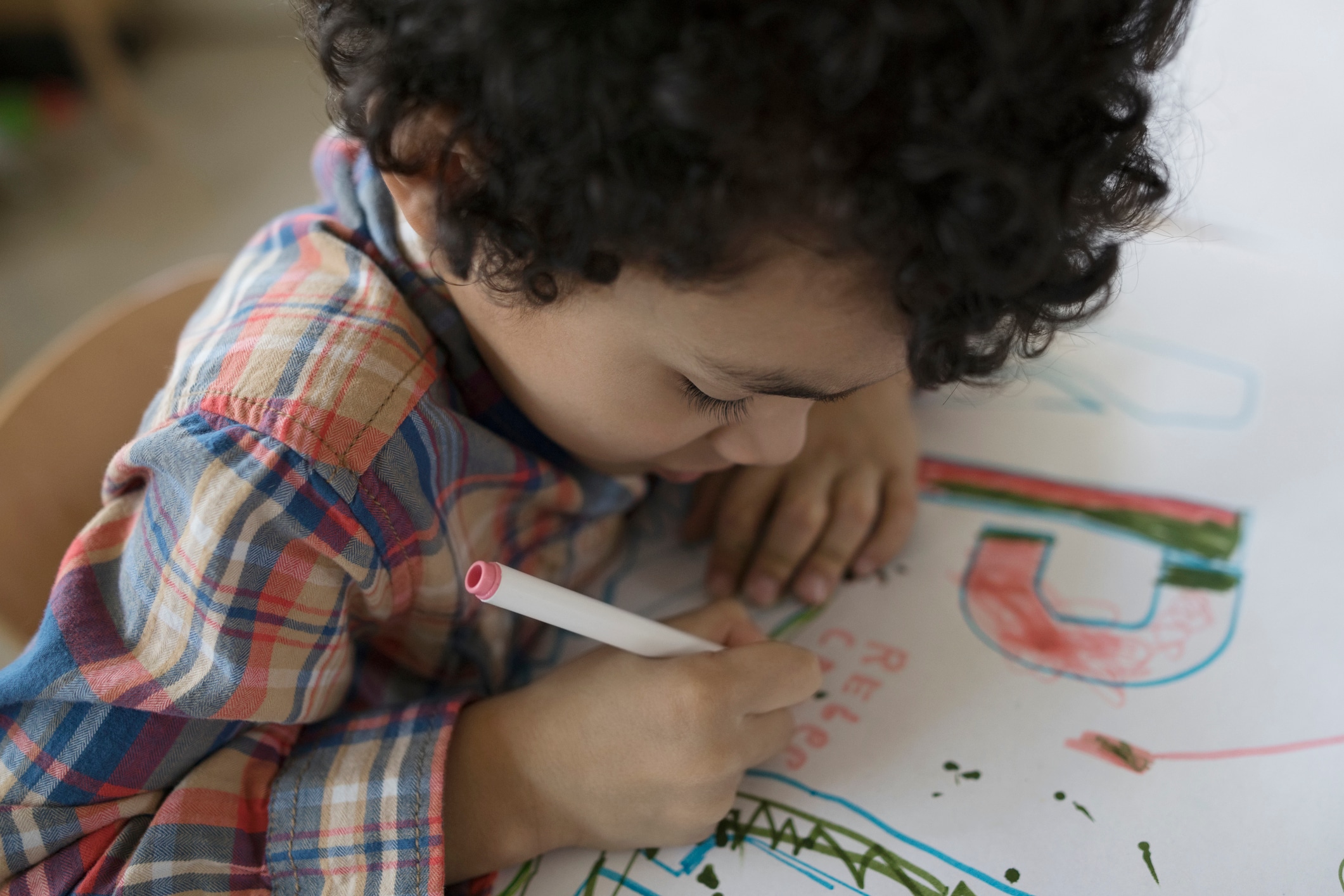You’re sitting on the bench at the park, keeping an eye on your child as they play and minding your own business. Suddenly, your child is in front of you, dragging another kid along with them and breathlessly asking if you can arrange a playdate. You make eye contact with the other child’s parent and start the awkward process of befriending a stranger for your child’s sake.
While this story can have a happily ever after ending, in which you both become close friends, very few disagreements ever arise and you take turns babysitting each other’s kids, you may also find yourself jammed together with another adult that you don’t have anything in common with, who has completely different parental philosophies or maybe even makes questionable decisions when it comes to safety issues. And, while it can be uncomfortable, it is also common.
“There’s this expectation [that we’re] supposed to be best friends with our kids’ friends’ parents, and that’s not necessarily [going to be] the case,” says Megan Davis, a licensed clinical social worker. “Just as with any relationship, there can be multiple factors that contribute to those relationships being more of an ‘acquaintance-level’ — parenting differences, personality incompatibilities, differences in family values/lifestyles and/or parental age/life stage differences.”
Read on to get advice on navigating these complicated relationships.
“There can be multiple factors that contribute to those relationships being more of an ‘acquaintance-level’ — parenting differences, personality incompatibilities, differences in family values/lifestyles and/or parental age/life stage differences.”
— Megan Davis, a licensed clinical social worker
What to do first when you don’t get along with other parents
When you find yourself at odds with another parent, it’s important to examine where those feelings are originating from, and then, consider the pros and cons of letting your child’s friendship continue. Doing so will help you decide on next steps, whether that means addressing the issue directly with the other parent, setting certain boundaries and/or allowing the friendship to continue.
Reflect on your feelings of discomfort
There are many reasons why a parent-to-parent relationship can go south, and since it also affects the children involved, it’s important to examine where those feelings of unease are originating from.
Do you practice gentle parenting, but it’s clear your child’s friend’s parent is running an authoritarian household? Is your home a gun-free zone, and they’re big into hunting? Or is it simply a difference in personality — you and your partner spend the weekend entertaining and socializing, while your child’s friend’s parent are more likely found participating in triathlons?
Or perhaps the disconnect is just there — an awkwardness with no real source, as was the case for Frank S., a parent of three in Los Angeles, California. Despite his attempts to befriend the parents of his twins’ best friends, conversations were stilted and uncomfortable, making outings feel longer than they should.
While there was a distinct lack of danger in this situation, Frank S. noted that his children picked up on the other parents’ coldness. This general level of discomfort between families led him to suspect that they wouldn’t be hanging out socially and that they’d likely only interact when they ran into one another at school.
Explore the risks vs. the benefits for your child
When safety is not a concern, as in Frank S.’s case, Davis suggests that parents look at the bigger picture when deciding if a friendship can and should continue. “It is really important [to tune] into your values, both as a parent, but also as a human who is interacting with others in the world, to determine, ‘OK, maybe I don’t like how this person talks or how they show up in our interactions. But that’s something that I can get past for the sake of my child’s friendship,’” she notes.
Additionally, Heidi McBain, a licensed marriage and family therapist, says this can be a chance to demonstrate for and discuss with children how to handle situations where you don’t get along with someone. “We all need to have life skills that cover how to get along with difficult people and difficult situations, so this might be a teachable moment,” she says. After all, she adds, “Teachable moments are often made more relatable when we tell a story from our own life.”
However, if there is a larger concern, at the end of the day, it’s important to trust your gut. “As [parents], it’s our job to keep our children safe,” says Davis. And that might require setting boundaries or cutting off communication, depending on each unique situation.
“It is really important [to tune] into your values, both as a parent, but also as a human who is interacting with others in the world, to determine, ‘OK, maybe I don’t like how this person talks or how they show up in our interactions. But that’s something that I can get past for the sake of my child’s friendship.'”
— Megan Davis
How to navigate the relationship with the other parent
If you are determined to salvage your child’s relationship with their friend, despite your relationship with their parents, the experts we spoke to suggested a few tactics to keep things civil.
Foster open communication with both your child and the other parent
Davis recommends being open with both your child and the other parent about potential concerns. Depending on their age, she suggests bringing your child on board in terms of navigating the situation.
While the parent should take the lead in setting boundaries with the other parent when children are young (elementary-aged and younger), teens can be looped in a bit more to help problem solve, Davis says. She suggests asking questions like, “How does [the situation] make you feel? What are some ways that we can problem solve? Would you like to invite your friend over to our house more frequently or for me to drop you off at the movies,” rather than hanging out at their house. Enlisting them in tackling this task will prepare them to face similar situations in the future, where they don’t feel comfortable or safe.
When it comes to the other parent, Davis also advises clearly and directly communicating your concerns. While the other parent may or may not be receptive to the conversation, that alone can give you a sense of your path forward. For example, if the other parent is not hearing any of your concerns and responding respectfully, that might result in a need for stronger boundaries, says Davis.
Establish boundaries
What boundaries will look like will heavily depend on the ages of the children involved, the concerns at play and other factors. However, both McBain and Davis agree that a neutral space may make it possible to maintain your child’s friendship, such as a park, library or children’s museum.
Other boundaries may include ensuring that you’re always present for playdates or that your child’s friend always comes over to your house, says McBain.
Know that you don’t have to be best friends
For many parents, there’s this picture-perfect vision of what playdates will look like: sitting on the deck, sipping their coffee while the children play or planning weekend outings together for the two families. But the reality is that sometimes you’ll connect and other times you might not. And that’s OK, says Davis.
However, she adds that the situation can be a good opportunity to model “how you can hold these two different things [in your mind] at the same time: how you can hold values of respect and kindness, while also acknowledging this person just rubs you the wrong way.”
“We all need to have life skills that cover how to get along with difficult people and difficult situations, so this might be a teachable moment. Teachable moments are often made more relatable when we tell a story from our own life.”
— Heidi McBain, a licensed marriage and family therapist
When to intervene
As with any other challenging relationship, there will be degrees of discord, depending on your particular situation. You may simply be incompatible personality-wise with your kid’s friend’s parent, or you may disagree with them on fundamental levels that involve questions of safety. And if you reach a point where you’re asking yourself if the relationship between your child and their friend is worth navigating these safety concerns (such as a lack of supervision in their home or access to dangerous substances), it might be time to explore the situation closer, says Davis.
“Regardless of age, it can be helpful to ask children open-ended questions about time spent with their friends,” she explains. “This can give parents a sense of the quality of the friendship and increase opportunities for children to discuss anything that potentially feels uncomfortable.”
This might look like asking questions like, “What types of things did you enjoy while spending time with X?” and “What types of things were a challenge or difficult?”, she adds. “Follow your child’s lead and ask questions from a place of curiosity, rather than judgment,” she advises.
For parents of teens and older adolescents, she says they “might find it helpful to ask more direct questions due to their child’s developmental stage,” as “they are likely spending more unsupervised time with friends and have increased awareness of potential safety concerns.”
And if those conversations with your teen lead you to believe there’s a significant enough issue to intervene in the friendship, McBain advises you to address it with your child. “Depending on the age of your kids and the relationship you have with them, the hope is that you can have an open conversation with them about your concerns about the other parent,” she says.
On the other hand, “the younger they are, the easier it is to intervene on your kid’s behalf and turn down the play date requests,” adds McBain.
The bottom line on navigating discomfort with your child’s friend’s parent
Relationships with your child’s friend’s parent can be challenging when you don’t see eye-to-eye, whether that’s because of personality differences, a disconnect in values or general safety concerns. After all, in situations like these, parents are typically thrust into forced interactions when their children make friends, rather than forming a friendship of their own accord.
However, it’s important to balance your values and feelings with the benefits the friendship may have for your child. Inspect your gut instincts and decide if your hesitations are the result of true concerns or simply a personality disconnect.
And if you’re having trouble working through your feelings, McBain adds that therapy can be a great place to talk through your parenting concerns with someone who is unbiased. A therapist can “help you process grief, work through past trauma and give you more understanding around how your current symptoms might be related to a mental health issue like anxiety or depression, along with many other possible benefits to you and your family moving forward.”
Ultimately, while you’re never required to become best friends with your kid’s friend’s parent, you can use a situation like this to model respect and kindness in the face of differences. And that will hopefully have a much more lasting impact on your child than the friendship.





